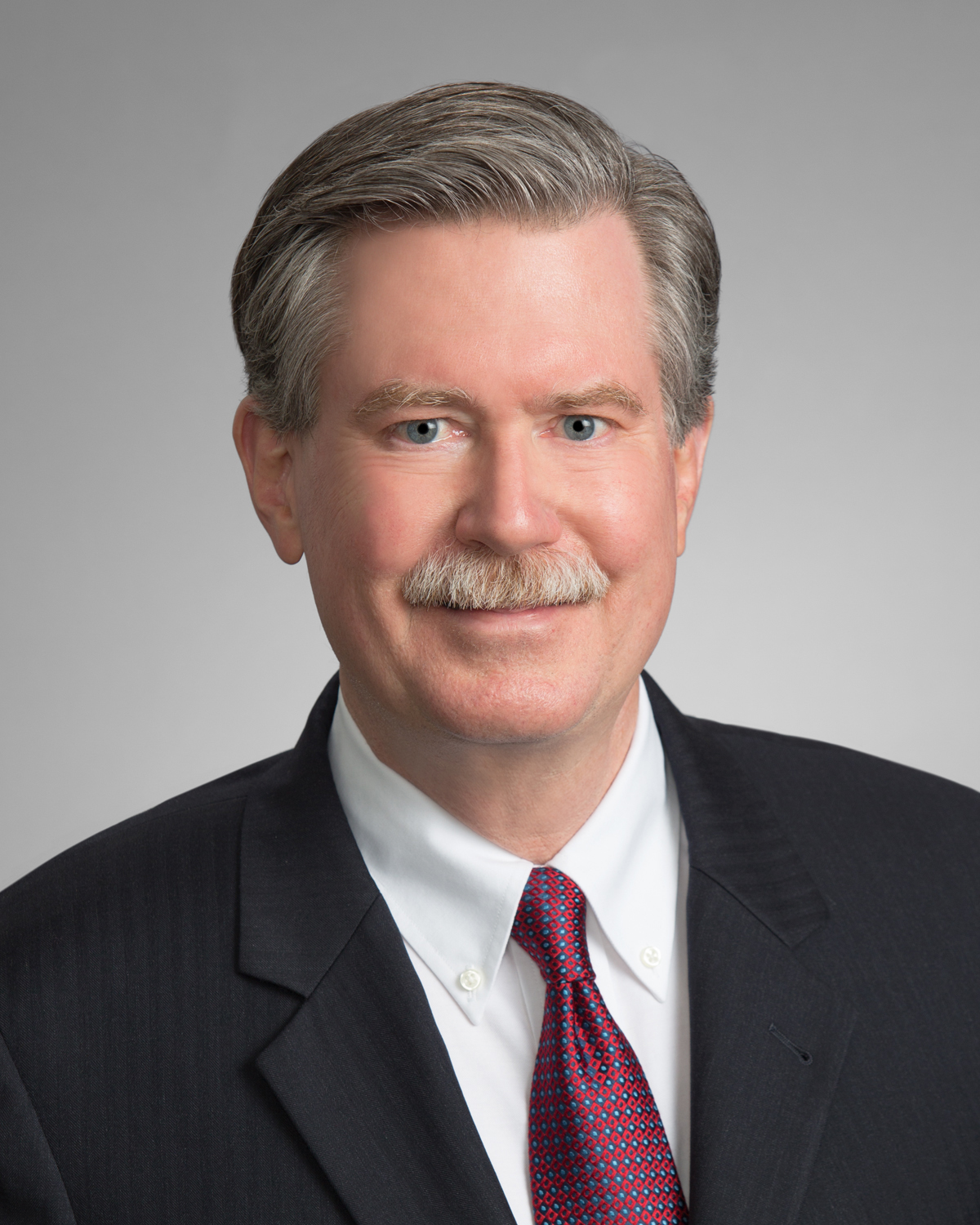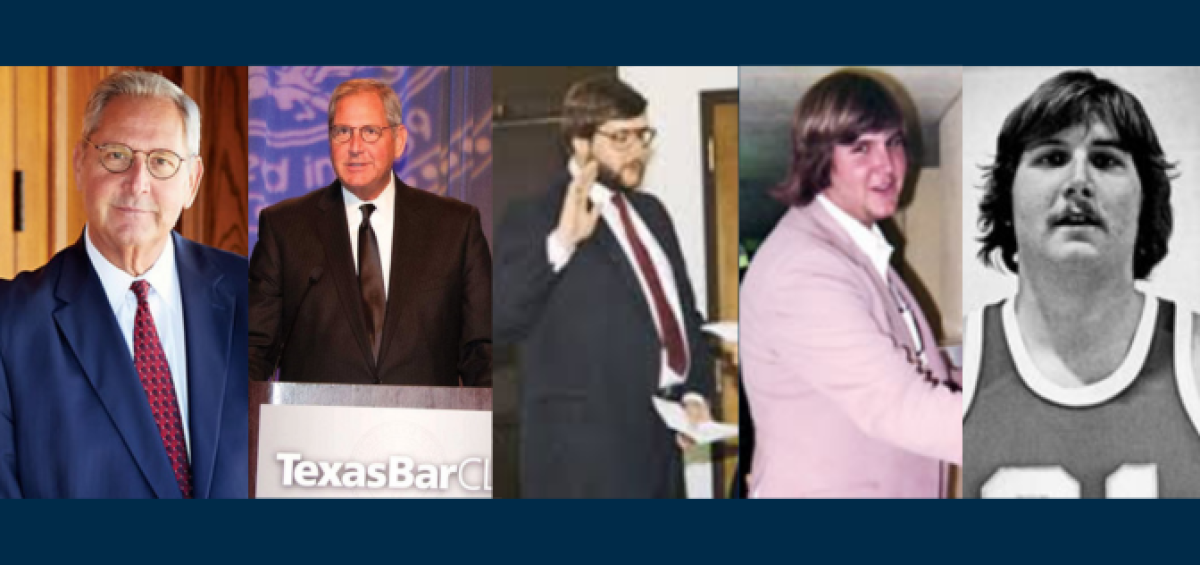“One reason it is so important to be cognizant about how we conduct ourselves as lawyers is that we can never be certain who is watching and what they may be taking away from our conduct.” – Tom Vick
by Frank E. Stevenson
Locke Lord LLP
Nobody likes the Family Law Section. No one. None. Nobody.
That’s because the Family Law Section seems to derive more satisfaction, achieve more cohesiveness, develop more friendships, and have more fun than any other practice area of the Texas Bar. And all that despite encountering most of their clients at the angriest and most combative junctures of their entire lives. How?
Maybe from watching Tom Vick.
State Bar President Cindy Tisdale recalls the terror she felt “the first time I had a case with THE Tom Vick as opposing counsel.” But instead of trying to intimidate her with his experience, behavior, or bearing – Tom is a gazillion feet tall after all – Cindy recalls “the collegial and common-sense way he approached the case.” Tom wanted only “to reach a result that was best for the family.” And from that day forward, Cindy has only wanted that, too.
Cindy was watching. And “if THE Tom Vick wasn’t in it for the fight, then why should I be?” Thus, her career-long approach to the practice of law was set that day by watching Tom Vick.
People have been watching Tom Vick for a long time. An accomplished athlete, Tom nonetheless chose Austin College because it emphasized academics over athletics; he starred on the varsity basketball team there. Tom then obtained his law degree from South Texas College of Law and joined his father practicing family law in Weatherford at the firm now known as Vick Carney. People were watching. At the tender age of 27, Tom was elected Mayor of Weatherford and later a school district trustee.
But it wasn’t just Tom’s Parker County neighbors who were watching; his family-law colleagues were watching, too. Tom served as director for several statewide and nationwide family law courses and institutes, made dozens of CLE presentations, and wrote numerous law articles. Gary Nickelson, a celebrated family law bar leader with Goranson Bain Ausley, notes “Tom’s educational style of writing and speaking are flawless and educate the audience fully on the topic.”
Tom earned his board certification in Family Law and was recognized as a Fellow of the Texas, American, and international family law academies. Tom helped edit the Texas Family Law Practice Manual and the Family Law Forum, chaired the State Bar’s Family Law Section, was president of both the Texas Academy of Family Law Specialists and the Texas chapter of the American Academy of Matrimonial Lawyers, and was elected a national officer of the latter. Several organizations lauded Tom for his preeminence in and contributions to family law: the State Bar with its Dan R. Price Award, the Texas Academy of Family Law Specialists with its Judge Sam Emison Award, and the American Academy of Matrimonial Lawyers with its Fellow of the Year. And the more he contributed, the more people watched.
Tom worked to eliminate the barriers to our legal system as a member of the Texas Access to Justice Commission, chair of the Supreme Court Task Force to Expand Legal Services Delivery, and chair of the Family Law Section Pro Bono Committee. Nickelson recruited Tom to begin a seminar program that offered free CLE to rural attorneys in return for their accepting two pro bono cases from legal aid; the program has grown to six seminars annually, enhancing lawyer competence while at the same time providing critically needed legal services to hundreds of underprivileged Texans. And people watched that, too.
So, when state officials removed more than 400 children from a religious community near Eldorado, it was Tom who mobilized 400 lawyers to address the crisis. “I’d never been more proud to be a lawyer,” Tom recalls, “than that morning when so many of my colleagues came from all over the state and lined up to get into the courthouse to safeguard the rights of those children.” It was the largest custody case ever filed in the US and the largest single pro bono effort in Texas history. The next edition of the Sampson & Tindall’s Texas Family Code was dedicated to Tom in recognition of his leadership. Nickelson states plainly: “I don’t know of anyone else in Texas who has that ability and contacts to make that happen.” Truth. Only a person living a watched life can accomplish such things.
More and more non-family law lawyers were watching Tom, too. He was selected for the Texas Bar Foundation Board of Trustees and later elected its Chair. Tom was elected to the State Bar’s Board of Directors in 2005, and ultimately elected by the State Bar membership as its 2017-18 President. And, of course, he was watched all the more – including by our current State Bar President Tisdale who credits Tom’s influence with “why I am where I am today.” She’s not the only one.
Tom’s son, Gabe Vick, is a highly accomplished litigator with Gray Reed. When he was eight years old, Gabe asked his father what lawyers do. “His response was ‘lawyers help people’,” Gabe recalls. It’s an axiom the son has seen lived out by his father over and over again – in the high-profile mobilization for the children in Eldorado and “in his daily interactions that don’t make headlines.” Being a gazillion feet tall – like Tom – gets you noticed, but it doesn’t get you watched. Watching – for better or worse – is the result of conduct. Tom Vick, the son and the father of Texas lawyers, is both consequence and cause of the best kind of watching.
People never tire of the best kind of watching. Dan Carney, his law partner who has sat 30 feet from Tom almost every workday for 40 years, could be forgiven for being a bit jaded. He’s not. “There is not a more skilled or talented family attorney in the State of Texas,” he concludes. The same for Holly Hearn who recalls how, during her first hearing opposite Tom, she instantly realized that more than simply someone to learn from, Tom was “someone I wanted to be like.” To best accomplish that she joined Vick Carney seven years ago. Hearn regularly sees how Tom puts into practice the “lawyers-help-people” answer he gave his then-eight-year-old son. Because of Tom’s prominence, he is deluged with calls seeking various kinds of help. Even though those inquiries are mostly from utter strangers, “he calls them all back and offers whatever guidance they need.”
Always looking for opportunities to help people, always doing more than what’s required, always seeking to enhance the competence and professionalism of Texas lawyers, and always conducting himself as if he’s being watched is the story of Tom Vick. And, if you’re reading this article, it’s likely your story, too.
That’s because you, like Tom Vick, are a member of the Texas Bar College.
The College is unique; there isn’t any organization in any way like it anywhere. By one measure its purpose is to promote CLE. But by any measure that actually matters, it’s hardly about CLE at all.
Consider the language of the Texas Supreme Court’s order establishing the current College. Three of the College’s four stated purposes focus not on the CLE but on the lawyers who teach and take it. The College exists to “recognize and encourage” those lawyers, to “promote [them and the College] among members of the State Bar and the general public,” and to “recognize and encourage” those lawyers’ outstanding service to the profession and the public. The overriding purpose of the College is to call attention to a certain kind of Texas lawyer – namely, the lawyers to watch.
The lawyers to watch have never been more needed than right now. More and more of our work is transacted over the internet and less and less face-to-face. The practice of law is growing increasingly impersonal, and mentoring grows increasingly difficult. We don’t have as many opportunities to show by our conduct the proper course for the lawyers watching us. So, we must make every opportunity count.
We do that by living a life watched. Striving to be at our professional best whenever someone might be watching. Because, as Tom said, “we can never be certain who is watching and what they may be taking away from our conduct.” And those takeaways could have profound consequences – positive or negative – for the lawyers watching and for our profession.
Yes, the lawyers of our state will find lawyers to watch and will allow the conduct they see to shape their own. Whom those lawyers watch lies at the core of the College’s purpose and work. Every time we renew our membership in the College, each of us sends a simple, categorical message to those lawyers and the public they serve.
Watch me.
 Frank Stevenson | Texas Bar College Board Director and 12-Year College Fellow
Frank Stevenson | Texas Bar College Board Director and 12-Year College Fellow
Frank Stevenson is of counsel at Locke Lord LLP and practices in the areas of real estate/finance and public law. Stevenson served as 2016-2017 President of the State Bar of Texas and the 2021-2022 President of the Western States Bar Conference. Additionally, he is the former Chair of the Dallas Bar Foundation, a former Chair of the State Bar Board of Directors, and a former President of the Dallas Bar Association. Stevenson was the founding chair of award-winning programs to mentor beginning lawyers and to diversify the profession. He holds numerous leadership positions with civic, charitable, arts, and educational organizations. He and his wife, Helen, have three grown children.
Read More
Member Spotlight: Mark Edward Harrington
Enjoy this inspiring profile of member Mark Edward Harrington of Houston discussing memorable moments, fun facts, and why he joined Texas Bar College.
A Debtor, Creditor, and Trustee Walk Into a Bar
An overview of bankruptcy practice and procedure
by Beth Smith




